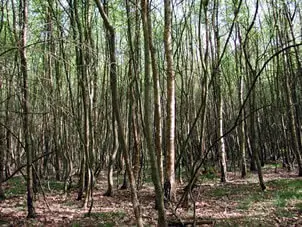Through all forms of obstacle that are put in one’s way.
Through thick and thin
What's the meaning of the phrase 'Through thick and thin'?
What's the origin of the phrase 'Through thick and thin'?
‘Through thick and thin’ is one of the English language’s older expressions and one that has maintained its figurative meaning over many centuries. It is venerable enough to date from the times when England was still a predominantly wooded country, with few roads and where animals grazed on what was known as wood pasture, that is, mixed woodland and grass.
The phrase originated as ‘through thicket and thin wood’, which was a straightforward literal description of any determined progress through the ‘thick’ English countryside.
The earliest citation I can find that uses our contemporary wording is in Richard Baxter’s religious text A Saint Or a Brute: The Certain Necessity and Excellency of Holiness, 1662:
“Men do fancy a necessity [of holiness] where there is none, yet that will carry them through thick and thin.”
The phrase had been in use in Old and Middle English, in the literal ‘thicket or thin wood’ sense, for some centuries before that. The earliest known usage is in Geoffrey Chaucer’s The Reeve’s Tale:
And whan the hors was laus, he gynneth gon
Toward the fen, ther wilde mares renne,
And forth with “wehee,” thurgh thikke and thurgh thenne.[And when the horse was loose, he begins to go
Toward the fen, where wild mares run
And forth with “wehee,” through thick and through thin]
The history of “Through thick and thin” in printed materials
Trend of through thick and thin in printed material over time
Browse more Phrases
About the Author

Phrases & Meanings
A-Z
A B C D E F G H I J K L M N O P Q R S T UV W XYZ
Categories
American Animals Australian Bible Body Colour Conflict Death Devil Dogs Emotions Euphemism Family Fashion Food French Horses ‘Jack’ Luck Money Military Music Names Nature Nautical Numbers Politics Religion Shakespeare Stupidity Entertainment Weather Women Work
How did we do?
Have you spotted something that needs updated on this page? We review all feedback we receive to ensure that we provide the most accurate and up to date information on phrases.
